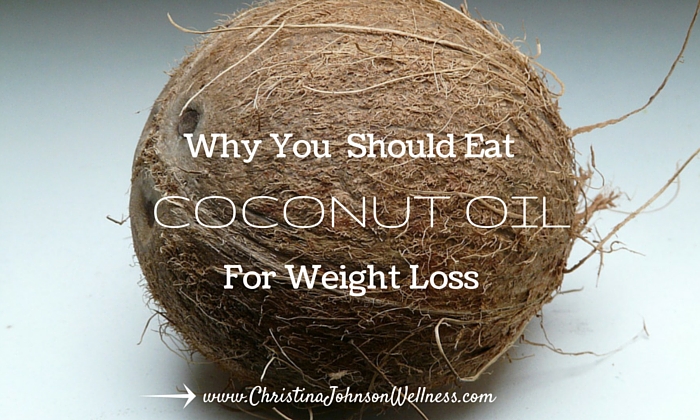Wait…eating fat can actually help you lose weight?!? I know this goes against everything we’ve been taught for the past several years, but study after study is proving this to be true.
For many years, coconut oil has had a bad reputation because of its saturated fat content. Finally, though, the mainstream medical community and the media are acknowledging the many benefits of coconut oil.
I mean, Dr. Oz has even gone on television and recommended that people eat coconut oil! More importantly, though, research studies have been conducted which back up these claims.
While I could go on and on about all of the benefits of coconut oil (and that might just be a topic for another blog post), today I want to focus on one thing in particular: coconut oil for weight loss.
What Makes Coconut Oil Unique?
Most fats we consume are long-chain fatty acids (fats founds in foods such as olive oil, soybean oil, fish, nuts, and meat). Coconut oil, on the other hand, is a saturated fat made up of medium chain fatty acids (MCFAs).
Why does this make a difference? Well, long-chain fatty acids require more steps for our body to complete in order to break them down, and they require our body to produce bile acids and lipases in order to properly digest these fats. Medium-chain fatty acids are smaller and easier to break down, which means that we don’t need any special enzymes to digest them. In fact, MCFAs are sent straight to our liver to be digested and used as an immediate source of energy in our bodies [1].
Keeping this in mind, let’s look at exactly how coconut oil promotes weight loss.
Why Eating Coconut Oil Promotes Weight Loss
- Coconut Oil Increases Energy Expenditure: One study found that when a low-to-moderate amount of MCFAs are eaten with every meal, people actually expend 5% more energy [2]. More energy spent means more calories burned!
- Coconut Oil Decreases Abdominal Fat: Another study gave a group of women either coconut oil or soybean oil on a daily basis for 12 weeks. The researchers found that the group of women who supplemented their diet with coconut oil actually decreased their waist circumference. The study concluded that coconut oil appears to promote a reduction in abdominal obesity [3]. This is great news since abdominal obesity tends to be the most dangerous kind since the extra abdominal fat surrounds so many vital internal organs.
- Coconut Oil May Support Thyroid Function: Many experts believe that an underactive thyroid may be one of the primary causes of weight problems among women. Studies are now showing, though, that the MCFAs in coconut oil may support optimal thyroid functioning, which will help to promote a healthy weight [4].
- Coconut Oil is Less Likely to Be Stored as Fat: Due to the structure of the MCFAs, coconut oil boosts our metabolism. Because it goes directly to the liver, it is much more likely to be converted into energy for immediate use and not likely to be stored as fat [1].
- Coconut Oil Promotes Satiety: Eating coconut oil will help satisfy your hunger so that you are less likely to overeat. I also find that it sometimes curbs cravings for sweets.
Bonus Coconut Oil Tips
Choose a Good Quality Coconut Oil:
Be sure to choose a coconut oil that is organic, unrefined, and made without heat processing or chemicals.
How Much To Eat:
Most experts believe that eating 1 to 2 tablespoons per day of coconut oil will be beneficial.
Start Slowly:
Because coconut oil does have antibacterial, antifungal, and antimicrobial benefits, it is wise to start with a small amount of coconut oil (maybe a half teaspoon or so) and then gradually increase how much you eat as your body gets used to it.
A Word of Warning:
When I first started using coconut oil, I had no idea that it could change consistency. I bought the coconut oil and it was in a solid form, but a couple of days later I discovered that it had become a liquid! I was worried that it had gone bad or that something was wrong with it.
What I didn’t realize at the time is that coconut oil will turn to a liquid around 76°. If the temperature in your house is lower than that, it will be a solid. So if it changes consistency on you, it hasn’t gone bad, the temperature has just changed!
I would love to hear what you think about coconut oil, if you currently are eating it, and what some of your favorite uses are! I always love to hear about new uses for coconut oil, so please share your ideas in the comments below!
Sources
[1] Axe, Josh. (n.d.) The Top 5 Health Benefits of Coconut Oil [Blog post]. Retrieved from http://draxe.com/the-top-5-health-benefits-of-coconut-oil/.
[2] Clin Nutr, Eur. (March 1996). Twenty-four-hour energy expenditure and urinary catecholamines of humans consuming low-to-moderate amounts of medium-chain triglycerides: a dose-response study in a human respiratory chamber. Retrieved from http://www.ncbi.nlm.nih.gov/pubmed/8654328.
[3] Assancao, ML; Ferreria HS; dos Santos, AF; Cabral CR; & Florencio TM. (July 2009). Effects of dietary coconut oil on the biochemical and anthropometric profiles of women presenting abdominal obesity. Retrieved from http://www.ncbi.nlm.nih.gov/pubmed/19437058.
[4] Mercola, Joseph. (Nov. 8, 2003). How to help your thyroid with coconut oil. Retrieved from http://articles.mercola.com/sites/articles/archive/2003/11/08/thyroid-health-part-two.aspx.



